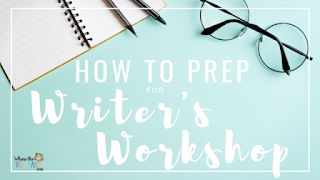
I think all teachers would agree that our biggest hope is that learning doesn't stop at the classroom door. We hope our students become readers and writers for life! School starts in just over two weeks, which is perfect time to get our teacher juices flowing with some Writer's Workshop training with Jessica Rogers from Rogers Education Consulting. I wanted to share with you (with her permission) a few of my favorite tips from her training! Mostly, I want to shamelessly share with you what I have been doing wrong could be doing better when teaching writing.
Blame it on my OCD, but I want if I just read a book about the jungle, I want my students to reflect on and write about the jungle!! In a perfect world, students would do that. What I learned, is that my weaker students will easily write about the jungle because I most likely modeled a writing sample about a jungle and the students are simply mimicking my example. However, my STRONG students might think about a jungle, then have a chain reaction and relate it to one or more other things.
We as teachers DO NOT want to limit our students' creativity by telling them what they HAVE to write about. We need to be ENCOURAGING our students to take ownership of their writing by letting them choose their own topic when teaching writing.
Please don't get me wrong. I fully intend on having back up plans with writing prompts, word banks, etc. in case students get stuck or need options to choose from. I have writing prompts ready for daily writing, letter writing, how to writing and holiday themed writing {Check them out here}. BUT, I plan to tell my students “You can write about this prompt, OR you can write about anything else you feel passionate about”.
You know you've done it. Well, maybe it's just me, but I've been guilty of trying to cover too much ground at one time. I think “Okay, we are going to read this book. We are going to reflect on it. We are going to talk about common themes. We are going to discuss one writing skill to focus on. The students are going to write these AMAZING writing samples based on the book. We are going to do a craft about the book.” (and so on).
What I learned today was to break it down. Jessica Rogers recommended reading the book once JUST FOR ENJOYMENT. Let the kids enjoy the story and work on comprehending the text. Later (a couple of days, weeks, etc.), you can pull the same book as an example in a writing mini-lesson. There are two amazing benefits I see with this method:
#1- Students are already familiar with the book and have already made connection to the text.
#2- You can save time because you can read 1-2 pages of the book that specifically address your new writing skill instead of spending another 5-10 minutes to read the entire book. (If we want students focusing on one skill, why are we re-reading an entire text and confusing their focus?)
Where Do I Start when Teaching Writing?
















